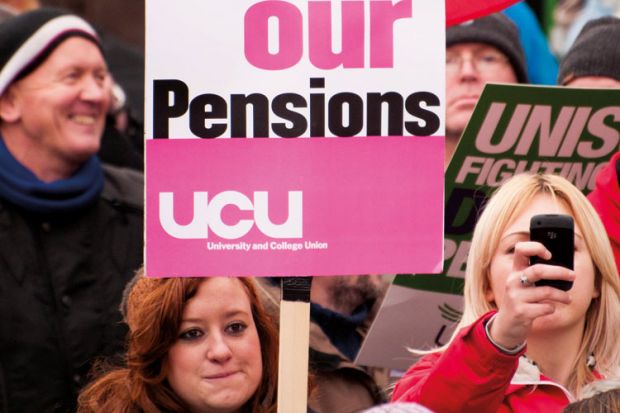Union leaders face a fresh revolt from members as they bid to negotiate a settlement to the dispute over pre-92 university pensions.
A letter signed by 90 academics, published in this week’s Times Higher Education, warns that the University and College Union is poised to “betray” members by accepting an end to their final salary pension scheme, and by stepping back from escalating industrial action in response to employers’ threats to dock the pay of lecturers taking part in an assessment boycott.
At least 10 union branches were believed to have passed motions calling for a special higher education conference to be convened to debate the way forward.
The UCU’s higher education committee was due to meet on 19 November to decide whether to suspend the industrial action, following the agreement of a schedule of meetings with representatives of Universities UK. This came after the union submitted counterproposals that accepted the potential end of the final salary element of the Universities Superannuation Scheme.
But the backlash from members has raised the spectre of more division within the membership, such as that which was seen during pay negotiations earlier this year.
The letter to THE, which counts a number of UCU higher education committee and national executive members among its signatories, agrees that a sector conference should be called.
It warns that a shift to a career revalued benefits (CRB) scheme would penalise women “by institutionalising past discrimination” and argues that any failure to respond to pay docking threats would be contrary to a policy of escalating action agreed at the last UCU annual congress.
“Agreeing to a career revalued benefits pension scheme, coupled with the abandonment of one of our key industrial weapons, would amount to a betrayal by our negotiators of union members,” the letter says.
Meanwhile, a statement from the UCU Left group, signed by 12 members of the higher education committee, warns that a suspension of industrial action now would hand the initiative to employers.
Sean Wallis, president of the UCU branch at University College London and one of the signatories to the UCU Left statement, said that there had to be “something concrete on the table” – not just a series of meetings – before de-escalation could be considered.
“You don’t halt a dispute because someone comes along and says ‘peace in our time’,” said Mr Wallis.
Suspension of the assessment boycott until the next Joint Negotiating Committee meeting on 15 January was proposed on condition that employers agree not to dock the pay of staff, and that lecturers pledge to catch up on marking.
A series of meetings would aim to “close the differences between the stakeholders’ negotiating positions, with a view to reaching agreement”, according to a statement issued by the UCU and UUK on 14 November.
A union spokeswoman said that the counterproposals had been agreed by the higher education committee and were in line with principles adopted by a conference of branch delegates. Requests for strikes from branches facing 100 per cent pay deduction have been approved, she said.
“UCU is committed to ensuring that USS continues to provide excellent, sustainable pension benefits for all,” the spokeswoman said. “It will be for the democratically elected HEC to make the decision on whether to suspend action in response to recent developments.”
Register to continue
Why register?
- Registration is free and only takes a moment
- Once registered, you can read 3 articles a month
- Sign up for our newsletter
Subscribe
Or subscribe for unlimited access to:
- Unlimited access to news, views, insights & reviews
- Digital editions
- Digital access to THE’s university and college rankings analysis
Already registered or a current subscriber? Login





